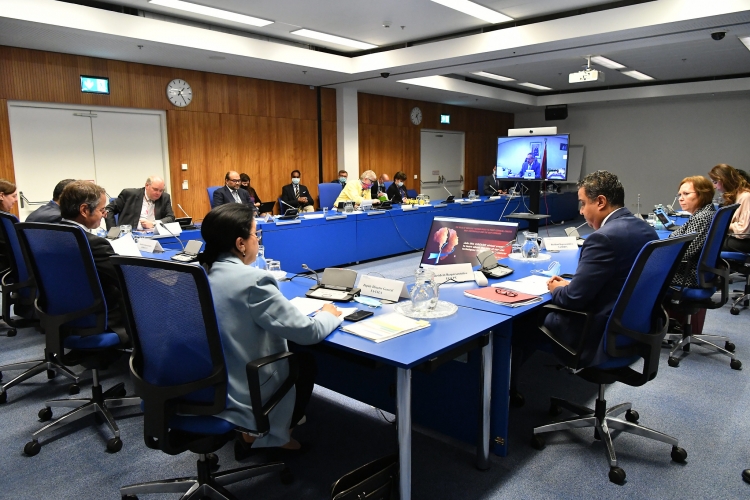Concerted action is needed to improve access to radiation and nuclear medicine in Africa and help address the scourge of cervical cancer, agreed participants of a virtual event held on the side lines of the 64th IAEA General Conference. The event, 'The role of nuclear technologies to fight cervical cancer in Africa: Past experiences and the way forward' was organized by the Kingdom of Morocco in partnership with the IAEA, to explore the impact of cervical cancer on women in African countries and identify ways to change the situation.
"Cervical cancer is a preventable and curable disease, if it is detected early and managed effectively," said IAEA Director General Rafael Mariano Grossi during his opening remarks at the event. "The fact that millions of women die from a preventable disease, often in what should be their most productive years, is a great tragedy and the IAEA is doing everything it can to change that." He explained how the IAEA, in part through collaboration with partners such as the World Health Organization (WHO), helps countries to develop comprehensive cancer control plans and safely set up and use radiation and nuclear medicine services.
Cervical cancer kills more than 300,000 women every year and is the most common female cancer in half of all sub-Saharan countries in Africa. Radiation and nuclear medicine, particularly a form of internal radiation treatment called brachytherapy, are the most common tools for diagnosing and treating cervical cancer. In many low- and middle-income countries, particularly in Africa, access to this type of care is often limited or unavailable.
"Radiation medicine is widely recognized as essential to cancer care, but many African countries lack the resources to provide it," said Azzeddine Farhane, Morocco's Ambassador to Austria and Permanent Representative to the United Nations in Vienna, during his introductory remarks. "The lack of health infrastructure and poor access to prevention, screening and treatment contributes to 90 per cent of the deaths."
In her keynote presentation, May Abdel-Wahab, Director of the IAEA's Division of Human Health outlined the role of nuclear technology in the management of cervical cancer and the need for investment in basic infrastructure and basic health. "Once diagnosed, cervical cancer can be treated very effectively with radiotherapy," she said. "Investment in treatment, training and infrastructure will reduce suffering, death and poverty in the region."

Participants of the virtual event followed discussions by panellists on their countries' experiences in fighting and controlling cervical cancer. The panel and the closing Q&A session with the audience was moderated by IAEA Deputy Director General Najat Mokhtar, Head of the Department of Nuclear Sciences and Applications.
Namibian Ambassador Nada Kruger shared her country's experience with limited access to radiotherapy centres and how a lack of access also affects the region more broadly. She underscored that fighting cervical cancer is not just about women; men need to be actively involved in supporting the fight against this preventable disease.
A crucial way to change the situation, explained Egyptian Ambassador Mohamed El Mola, is through collaboration and sharing of skills and knowledge through trilateral cooperation with Africa, Egypt and the IAEA. This coordinated effort is an avenue for improving cancer care infrastructure not only in Egypt but around Africa, he added.
One way to support programmes and collaboration is through project-based funding, said Belgian Ambassador Ghislain D'hoop, who explained how this kind of funding is key to reaching the most vulnerable in society. He reaffirmed his country's commitment to supporting programmes against cervical cancer in Africa.
Along with cooperation, capacity building and funding, a set of robust regulations is a must for the safe and effective use of radiation in medicine, said Khammar Mrabit, Director General of the Moroccan Agency for Nuclear and Radiological Safety and Security. He explained how Morocco has approached the fight against cervical cancer and is now working to support other countries in tackling the disease.
"Morocco is committed to strengthening its cooperation with IAEA Member States in Africa when introducing or improving nuclear technologies to fight cervical cancer," Mrabit said. "We will continue to provide education and training opportunities."
Cooperation using a clear roadmap can save women's lives, said Nono Simelala, the WHO's Assistant Director General, Special Adviser to the Director General, Strategic Programmatic Priorities. She described how clear, step-by-step plans involving countries and organizations, such as the IAEA and WHO, have already been helping countries strengthen access to necessary care. Such a roadmap could help eliminate deaths from cervical cancer, she added.
The IAEA is committed to doing its part in supporting global efforts to reduce the burden of cervical cancer, said Shaukat Abdulrazak, Director of the IAEA's Division for Africa. "It is my aspiration that every African Member State has at least one radiotherapy centre which serves its population, with at least one brachytherapy facility serving the needs of women especially. The issue of cervical cancer is not about HER but US."
In his closing remarks, Ambassdor Farhane recognized the impact of the IAEA's work and its partnerships with the WHO and other stakeholders. He re-emphasized the event's key message that greater collaboration is necessary to provide the funds, training and equipment needed to stop deaths from this preventable disease. He called on the IAEA and its partners to put forward a clear plan of action to ensure all cervical cancer patients in Africa have access to the radiation and nuclear medicine they need.






